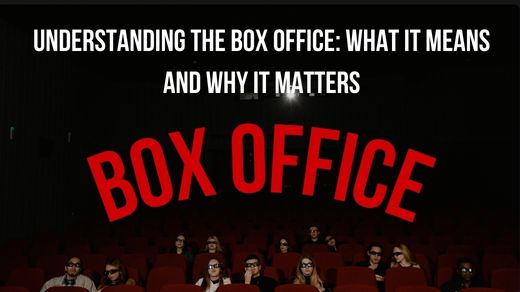The box office refers to a place where tickets are sold to the public for admission to various events, such as movies, plays, concerts, or other forms of entertainment. Patrons can perform the transaction at a countertop, through a hole in a wall or window, or at a wicket. In the context of the film industry, the term “box office” is often used as a metonym for the amount of business a particular production (such as a film or theater show) receives.
What Is the Box Office?
A box office is a place where tickets are sold to the public for admission to various events, such as movies, plays, concerts, or other forms of entertainment. Patrons can purchase tickets either in person at a physical location (like a theater or cinema) or online through digital platforms.
Measuring Success: Box Office Figures
The box office serves as a crucial metric for assessing the popularity and financial performance of a production. Here are some key points about box office figures:
- Ticket Sales: The primary function of the box office is to track the number of tickets sold. This data reflects the audience’s interest in a particular film or show.
- Revenue: Box office revenue is the total amount of money generated from ticket sales. It’s an essential indicator of a production’s financial success. However, it’s important to note that the box office gross doesn’t directly translate to profit for the filmmakers or studios.
- Film Industry Focus: While the term “box office” applies broadly to all events, it’s most commonly associated with the film industry. When we discuss a movie’s box office performance, we’re referring to its ticket sales and revenue.
Behind the Scenes: Distributors and Theatres
Understanding the box office also involves knowing how revenue is distributed:
- Theatre Share: Movie theaters retain a significant portion of the box office gross. On average, they keep nearly half of the revenue. The split varies from film to film, and the percentage for distributors is generally higher in the early weeks of a movie’s release.
- Distributor Rentals: The distributor’s share of the box office gross is often called “distributor rentals.” It’s the revenue received after deducting a “house allowance” or “house nut.” Distributors may receive a percentage of the gross revenue or a higher percentage after deducting the nut, whichever is larger.
Historical Origins
The term “box office” has a fascinating history:
- Elizabethan Theatre: The name “box office” was used during the Elizabethan era in theaters like the Globe Theatre. Ticket sellers collected admission fees in a money box at the entrance.
- 1786: By at least 1786, the term was widely used to describe the office where theater boxes were sold.
- 1904: The phrase “box office” was also used to represent total sales by 1904.
Global Impact
Box office figures are reported weekly, usually from Friday through Thursday, to account for film releases in the United States. The success of a film at the box office influences industry trends, casting decisions, and future investments.
In summary, the box office isn’t just about ticket sales; it’s a barometer of a production’s impact, popularity, and financial viability. So the next time you hear about a movie’s box office performance, remember that it’s more than just numbers—it’s a reflection of cultural influence and audience enthusiasm. 🎟️🎬
To Download The Latest Movies Click Here.



